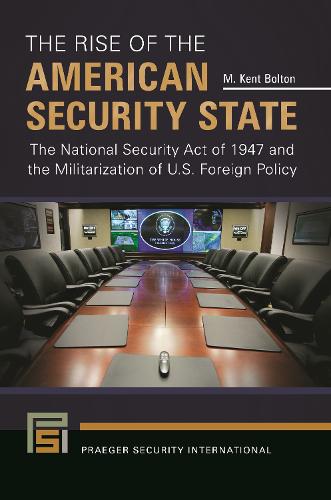
The Rise of the American Security State: The National Security Act of 1947 and the Militarization of U.S. Foreign Policy
(Hardback)
Available Formats
Publishing Details
The Rise of the American Security State: The National Security Act of 1947 and the Militarization of U.S. Foreign Policy
By (Author) M. Kent Bolton
Bloomsbury Publishing PLC
Praeger Publishers Inc
1st December 2017
United States
Classifications
Tertiary Education
Non Fiction
Military and defence strategy
History: specific events and topics
327.73009045
Physical Properties
Hardback
232
Width 156mm, Height 235mm
567g
Description
This book examines the impact of the National Security Act of 1947, the most important foreign policy legislation that many Americans (including policymakers and academics) have never heard of. Since September 11, 2001, the White Houseunder both Bush and Obamahas pushed the envelope of taking the United States to war (without declarations), interrogating prisoners of war, spying on potential threats, and acting unilaterally. Why have these trends occurred How has the apex of foreign power shifted, causing a sea change that has fueled a continual turf war between Capitol Hill and the White House And perhaps most critically, what is America's role in the world now, and what should it be The Rise of the American Security State: The National Security Act of 1947 and the Militarization of U.S. Foreign Policy argues that the National Security Act of 1947 and the early Cold War created a bipartisan consensus among U.S. policymakers that spanned several administrations. The result of this consensus and the National Security Act was the creation of permanent institutions: the permanent Defense Department with a secretary of defense; the intelligence community, which has grown to 17 agencies; and significantly, the National Security Council inside the presidency. Collectively, these three developments have led to the militarization of U.S. foreign policy. Readers will grasp how concepts and strategies that were in their infancy during the Cold War era have persisted and continued to affect today's U.S. foreign policy.
Author Bio
M. Kent Bolton is professor of political science and global studies at California State University San Marcos (CSUSM).
